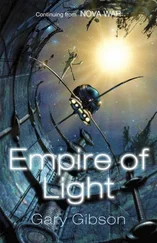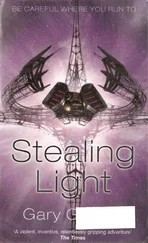She wiped her mouth with the back of her hand and took the beer from Nigel. Took a sip. It was warm. She handed it back to him. He took the toothpick from his mouth, started to raise the can for a swallow, thought better of it, put it down beside his welding-torch.
“Somethin’s wrong” he said. “I can tell.”
She massaged her wrists. Twin rings of rash coming up, pink and moist, where the plastic had gripped her. Picked up the ceramic knife and closed it automatically.
“Yeah” she said, “yeah something’s wrong…”
“What’s wrong, Chevette?” He shook hair out of his eyes like a worried dog, fingers running nervously over his tools. His hands were like pale dirty animals, capable in their mute and agile way of solving problems that would have hopelessly baffled the man himself. “That Jap shit delaminated on you” he decided, “and you’re pissed ….
“No” she said, not really hearing him.
“Steel’s what you want for a messenger bike. Weight. Big basket up front. Not cardboard with some crazy aramid shit wrapped around it, weighs about as much as a sandwich. What if you hit a b-bus? Bang into the back of it? You got more m-mass than the b-bike, you flip over and c-crack open crack your…” His hands twisting, trying more accurately to frame the physics of the accident he was seeing. Chevette looked up and saw that he was trembling.
“Nigel” she said, standing up, “somebody just put that thing on me for a joke, understand?”
“It moved” he said. “I saw it.”
“Well, not a funny joke, okay? But I knew where to come. To you, right? And you took it off.”
Nigel shook his hair back into his eyes, shy and pleased. “You had that knife. Cuts good.” Then he frowned. “You need a steel knife…”
“I know” she said. “I gotta go now…” Bending to pick up the paint can. “I’ll toss this. Sorry.”
“It’s a storm” Nigel said. “Don’t go out in a storm.”
“I’ve got to” she said. “I’ll be okay.” Thinking how he’d kill Nigel, too, if he found her here. Hurt him. Scare him.
“I cut them off.” Holding up the red ball.
“Get rid of that” she said.
“Why?”
“Look at this rash.”
Nigel dropped the ball like it was poison. It bounced out of sight. He wiped his fingers down the filthy front of his t-shirt.
“Nigel, you got a screwdriver you’ll give me? A flathead?”
“Mine are all worn down…” The white animals running over a shoal of tools, happy to be hunting, while Nigel gravely watched them. “I throw those flathead screws away as soon as I get ’em off. Hex is how you want to go—”
“I want one that’s all worn down.”
The right hand pounced, came up with its prize, blackhandled and slightly bent.
“That’s the one” she said, zipping up Skinner’s jacket. Both hands offered it to her, Nigel’s eyes hiding behind his hair, watching. “I… like you, Chevette.”
“I know” she said, standing there with a paint can with vomit in it in one hand, a screwdriver in the other. “I know you do.”
Baffled by the patchwork of plastic that roofed the upper deck, the rain was following waste-lines and power-cables, emerging overhead at crazy angles, in random cascades, miniature Niagaras rushing off corrugated iron and plywood. From the entrance to Nigel’s workshop, Chevette watched an awning collapse, gallons of silver water splashing all at once from what had been a taut concavity, a bulging canvas bathtub that gave way with a sharp crack, instantly becoming several yards of flapping, sodden cloth. Nothing here was ever planned, in any overall sense, and problems of drainage were dealt with as they emerged. Or not, more likely.
Half the lights were out, she saw, but that could be because people had shut them down, had pulled as many plugs as possible. But then she caught the edge of that weird pink flash you got when a transformer blew, and she heard it boom. Out toward Treasure. That took care of most of the remaining lights and suddenly she stood in near darkness. There was nobody in sight, nobody at all. Just a hundred-watt bulb in an orange plastic socket, twirling around in the wind.
She moved out into the center of the deck, trying to watch out for fallen wires. She remembered the can in her hand and flung it sideways, hearing it hit and roll.
She thought of her bike lying there in the rain, its capacitors drained. Somebody was going to take it, for sure, and Sammy Sal’s, too. It was the biggest thing, the most valuable thing she’d ever owned, and she’d earned every dollar she’d put down on the counter at City Wheels. She didn’t think about it like it was a thing, more the way she figured people thought about horses. There were messengers who named their bikes, but Chevette never would have done that, and somehow because she did think about it like it was something alive.
Proj, she told herself, they’ll get you if you stay here. Her back to San Francisco, she set out toward Treasure.
They who? That one with his gun. He’d come for the glasses. Came for the glasses and killed Sammy. Had those people sent him, the ones who called up Bunny and Wilson the owner? Rentacops. Security guys.
The case in her pocket. Smooth. And that weird cartoon of the city, those towers with their spreading tops. Sunflower.
“Jesus” she said, “where? Where’m I going?”
To Treasure, where the wolf-men and the death-cookies hung, the bad crazies chased off the bridge to haunt the woods there? Been a Navy base there, Skinner said, but a plague put paid to that just after the Little Grande, something that turned your eyes to mush, then your teeth fell out. Treasure Island fever, like maybe something crawled out of a can at that Navy place, after the earthquake. So nobody went there now, nobody normal. You saw their fires at night, sometimes, and smoke in the daytime, and you walked straight over to the Oakland span, the cantilever, and the people who lived there weren’t the same, really, as the people over here in the suspension.
Or should she go back, try to get her bike? An hour’s riding and the brakes would be charged again. She saw herself just riding, maybe east, riding forever into whatever country that was, deserts like you saw on television, then flat green farms where big machines came marching along in rows, doing whatever it was they did. But she remembered the road down from Oregon, the trucks groaning past in the night like lost mad animals, and she tried to picture herself riding down that. No, there wasn’t any place out on a road like that, nothing human-sized, and hardly ever even a light, in all the fields of dark. Where you could walk and walk forever and never come to anything, not even a place to sit down. A bike wouldn’t get her anywhere out there.
Or she could go hack to Skinner’s. Go up there and see– No. She shut that down, hard.
The empty rose out of the rain-rattled shadows like a gas, and she held her breath, not to breathe it in.
How it was, when you lost things, it was like you only knew for the first time that you’d ever had them. Took a mother’s leaving for you to know she’d ever been there, because otherwise she was that place, everything, like weather. And Skinner and the Coleman stove and the oil she had to drop into the little hole to keep its leather gasket soft so the pump would work. You didn’t wake up every morning and say yes and yes to every little thing. But little things were what it was all made of. Or just somebody to see, there, when you woke up. Or Lowell. When she’d had Lowell—if she could say she ever had, and she guessed she hadn’t, really—but while he’d been there, anyway, he’d been a little like that– “Chev? That you?”
And there he was. Lowell. Sitting up cross-legged on top of a rusty cooler said SHRIMPacross the front, smoking a cigarette and watching rain run off the shrimp man’s awning. She hadn’t seen him for three weeks now, and the only thing she could think of was how she really must look like total shit. That skinhead boy they called Codes was sitting up beside him, black hood of a sweatshirt pulled up and his hands hidden in the long sleeves. Codes hadn’t ever liked her.
Читать дальше











